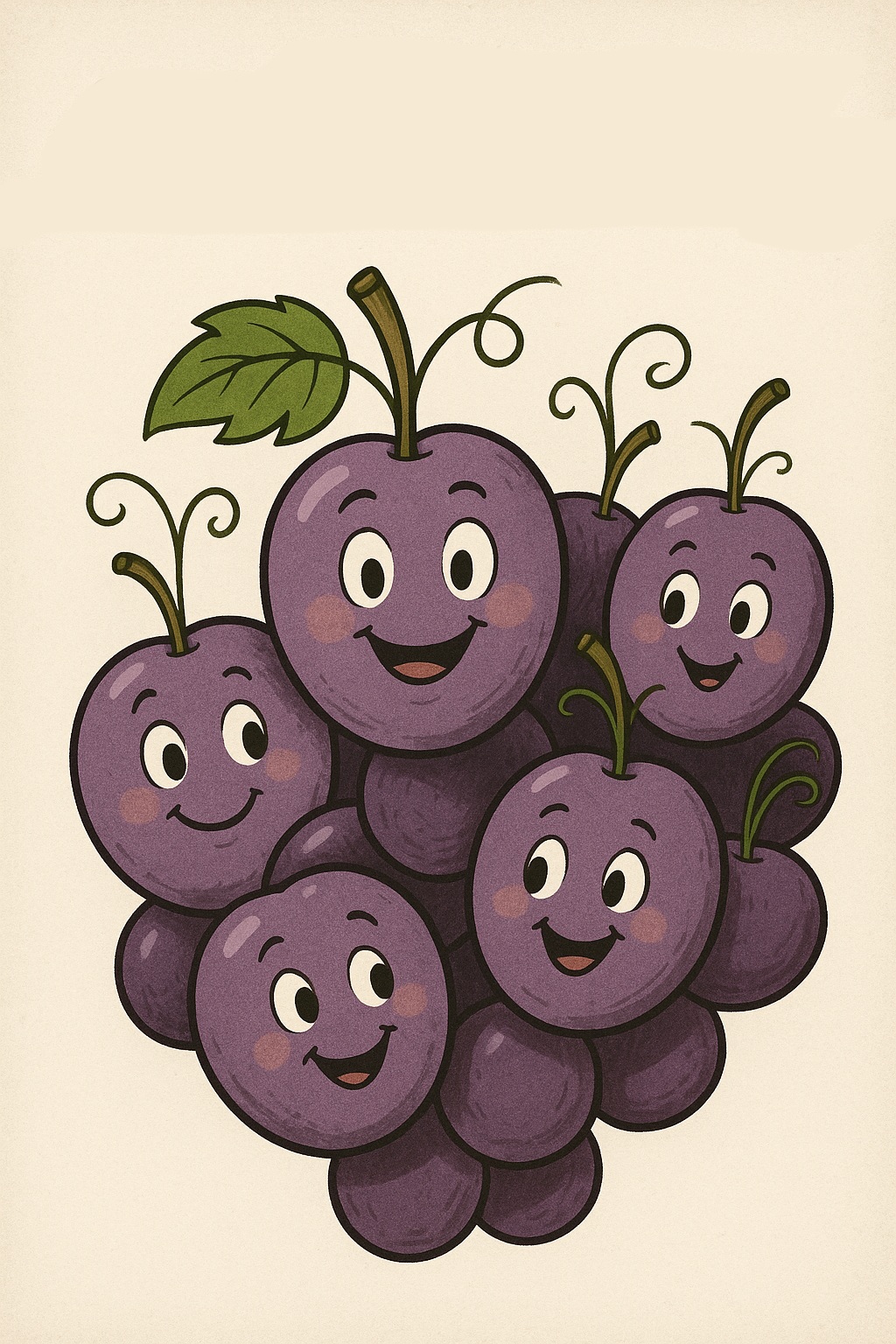
26 May Graham the Grape Gets Biodynamic: A Juicy Journey into the Wild World of Natural Winemaking
It was a quiet morning in the vineyard when Graham the Grape peeked out from under a dewdrop and whispered to his Bunch of Grape Mates, “Did anyone else feel that? The moon definitely just winked at me.”
His mate, Barry from the Bunch rolled his eyes. “You’ve been reading that biodynamic calendar again, haven’t you?”
“Yes, and for good reason!” Graham chirped. “We’re not just any grapes – we’re part of a biodynamic vineyard now!”
And so begins our juicy journey into the mystical, scientific, and sustainable world of biodynamic winemaking – with Graham the Grape and his Bunch of Grape Mates as our slightly squishy guides.
🌍 What Is Biodynamic Wine?
“Biodynamic wine,” Penelope the Pinot explained, polishing her skin with a leaf, “is more than just organic. It’s a holistic way of farming that treats the vineyard as a living, breathing organism.”
Biodynamic vineyards are farmed without synthetic pesticides or fertilizers, just like organic vineyards – but they go a step further by integrating lunar cycles, spiritual principles, and nature-based soil preparations. These vineyards operate as closed-loop ecosystems where everything – from plants and animals to the moon and stars – works in harmony.
The idea? Healthier soil, more resilient vines, and wines that truly express their terroir – that is, the unique taste of the place where the grapes are grown.

🌕 Why the Moon Matters

“So you’re telling me,” Barry asked with a skeptical squint, “that we harvest better under Sagittarius?”
“Correct!” said Graham. “In biodynamics, farming follows a special lunar calendar. There are Fruit Days for harvesting, Root Days for pruning, Leaf Days for watering, and Flower Days for resting.”
Each of these days aligns with the four elements – fire, earth, water, and air – and is believed to influence the vitality and quality of the grape. Whether or not you’re a cosmic convert, many winemakers swear by the calendar for producing wines with more energy and vibrancy.
🔮 The Steiner Story
The Grape Mates gathered under the vine to hear the tale of Rudolf Steiner, the Austrian philosopher who sowed the seeds of biodynamic agriculture in 1924.
“He was quite the visionary,” Penelope narrated. “Worried about the harm from synthetic chemicals in farming, he proposed a system that brought together science, spirituality, and sustainable practices. He called it biodynamics – and it was rooted in ancient traditions and his own philosophy of Anthroposophy.”
Steiner believed a vineyard should be treated like a single living entity, with its own soul. His ideas now guide thousands of farms and vineyards worldwide, and his teachings have even inspired educational models (like Waldorf schools) and holistic health movements.

🧪 The Magic Mixes: Biodynamic Preparations

“Let’s talk compost,” said Barry, now quite invested.
Biodynamic farming involves special preparations, each numbered and crafted from natural materials like herbs, minerals, and manure:
- 500 (Horn Manure): Cow dung aged in cow horns and buried over winter to boost soil vitality.
- 501 (Horn Silica): Crushed quartz to improve sunlight absorption.
- 502–507: Plant-based preps using yarrow, chamomile, nettle, oak bark, dandelion, and valerian to enrich the compost.
- 508: Horsetail tea to combat fungal disease.
These might sound like wizardry, but proponents say they improve microbial activity, balance plant growth, and deepen the vineyard’s connection to its environment.
📜 Certification and Standards
If you’re buying biodynamic wine, look out for Demeter or Biodyvin certifications. These organizations conduct rigorous audits to ensure the vineyard follows all biodynamic practices – including multi-year preparation, use of compost preps, and alignment with the biodynamic calendar.
In fact, Demeter has been certifying farms since 1928, and Biodyvin – especially active in France – focuses solely on vineyards.
🧃 Do Biodynamic Wines Taste Different?

“You bet your bottom bud they do!” Graham exclaimed. “Many wine lovers say biodynamic wines have a livelier character, more distinct expression of terroir, and better balance.”
These wines often contain fewer additives, sometimes no added sulfites, and are made with minimal intervention – meaning the grapes are allowed to speak for themselves.
But taste is subjective. Some experts detect a difference. Others say it’s more about philosophy than palate. Either way, more winemakers and drinkers are drawn to the idea of wine that’s alive.
🌱 The Bigger Picture: Sustainability, Biodiversity, and Soil Health
Biodynamic vineyards usually embrace biodiversity – with wildflowers, cover crops, sheep, bees, and birds all playing a part. This helps control pests, enrich the soil, and create a more resilient ecosystem.
It’s also great for the planet: reducing pollution, promoting carbon sequestration, and creating a model for truly sustainable farming.
As Christine Saahs of Nikolaihof, one of the world’s oldest biodynamic wineries, once said: “For the future, this is the only way to feed the world with healthy food.”

🍷 Graham’s Final Thoughts
As the sun dipped behind the hills and the moon rose into position, Graham smiled. “It’s not just farming. It’s a philosophy. A lifestyle. A love letter to the land.”
Penelope nodded. “And the wine? Well, it’s just the delicious bonus.”
🍇 Interested in Biodynamic Wines?
Want to try biodynamic wines made from grapes just like Graham the Grape and his Bunch of Grape Mates? Explore our Biodynamic Wine Selection and experience the magic for yourself.
Stay juicy, friends. 🍷

